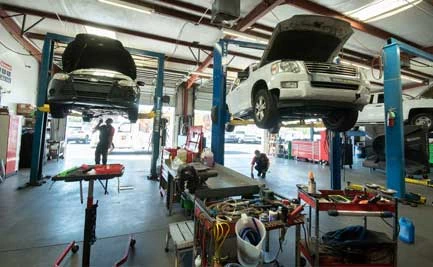Featured

When it pertains to automobile upkeep, the brakes are arguably one of the most vital system for ensuring your safety. Your brakes should function ideally to prevent accidents and respond quickly in emergencies. Regular brake inspections are vital to maintaining your stopping system in leading problem. Comprehending when and exactly how to check your brakes can conserve you from unsafe circumstances and expensive repair services later on. Here's an overview to assist you stay on top of brake inspections.
- Why Brake Evaluations Are Crucial. Brakes are created to put on down in time, however without regular examinations, you might not discover when they come to be less reliable. A defective brake system can lead to serious accidents, raised fixing expenses, and even the demand to change various other vehicle parts.
Brake examinations not just aid you catch possible issues prior to they escalate, but they also allow for better braking performance, enhanced lorry lifespan, and boosted security.
- Recognizing Indication for Brake Issues. While regular examinations are vital, you don't have to wait up until your automobile's following check out to the auto mechanic. Expect these indication that may indicate it's time for an evaluation:
Uncommon Noises: A piercing screech or grinding audio when applying the brakes typically indicates that the brake pads are used down or damaged. Soft or Squishy Brake Pedal: If the brake pedal really feels soft or squishy when pressed, there may be air or dampness in the brake lines, or the brake fluid may be low. Pulling away: If the lorry draws away while stopping, it could suggest uneven brake pad wear or a hydraulic issue in the brake system. Vibration in the Wheel or Pedal: If you experience resonance or pulsation when stopping, it might signify deformed rotors or uneven brake pad wear. Increased Quiting Distance: If it takes longer than common to bring your auto to a quit, it may be time to examine the brake pads, fluid degrees, or rotors. If you observe any of these indicators, it's finest to have your brakes checked instantly by a professional.
- Trick Elements Checked During a Brake Assessment. Throughout a brake examination, a licensed mechanic will take a look at several key components of the brake system to guarantee they're operating effectively. A few of one of the most integral parts to inspect include:
Brake Pads: These are the friction product that presses against the brake rotor to slow down the car. Over time, the brake pads use down and need replacing. Brake Rotors: Blades are the steel discs that the brake pads secure down on. They should be smooth and without deep grooves or fractures. Brake Liquid: The brake liquid moves the force from the pedal to the brakes. Reduced fluid degrees or old, polluted fluid can result in bad stopping performance. Brake Lines: Brake lines bring fluid from the master cyndrical tube to the brake components. They ought to be examined for leaks, fractures, or damages. Brake Calipers: These clamp the brake pads onto the blades. They should be in great functioning order and devoid of leakages. Regularly checking these elements ensures your stopping system operates smoothly and assists you prevent dangerous driving scenarios.
- How Usually Should You Obtain Your Brakes Inspected? The regularity of brake assessments depends upon your driving behaviors and the kind of lorry you own. As a general guideline, it's advised to evaluate your brakes a minimum of annually or every 12,000 miles. If you drive in hefty traffic, frequently bring heavy lots, or drive on sloping surface, more regular evaluations might be essential.
It's additionally a good concept to have your brakes evaluated if you notice any one of the indication discussed earlier, as this can prevent much more major issues.
- The Cost of Overlooking Brake Inspections. Ignoring routine brake examinations can cause serious repercussions. Worn brake pads, damaged blades, or reduced brake fluid can trigger your braking system to stop working when you need it most. Along with the security dangers, ignoring brake upkeep can lead to pricey repair services down the road.
For circumstances, if the brake pads are not replaced in time, the damages can reach the rotors, causing the requirement for blades replacement-- a pricey repair work. By organizing regular brake inspections, you can avoid these expensive repair services and maintain your stopping system in great condition for longer.

- What Occurs Throughout a Brake Examination? An expert technician will carry out a detailed inspection of your vehicle's stopping system, including looking for the complying with:
Brake Pad Density: Brake pads need to be replaced when they have worn down to a certain density. Rotor Condition: The mechanic will check the rotors for indicators of wear, warping, or scoring. Brake Liquid Degree: Low brake fluid can affect stopping performance. The technician will examine the liquid level and renew it if essential. Brake Line Honesty: The brake lines will certainly be checked for any type of leaks or splits that might endanger the brake system. When the inspection is complete, the mechanic will certainly educate you of any necessary repairs or substitutes.
Final Thought: Remain Safe with Normal Brake Inspections. Your brakes are vital to keeping you and your passengers secure when driving, so normal brake assessments should never ever be overlooked. By focusing on indication, organizing regular brake checks, and addressing issues immediately, you can guarantee that your brakes are always in top form.
Don't wait until your brakes fall short-- remain positive concerning brake maintenance. A little financial investment in brake evaluations today can conserve you from pricey repairs and hazardous situations in the future.
Latest Posts
Auto Care Services Near You! at MO
Your Neighborhood Floor Covering Specialists in Orland Park, IL
Full Circle Strategic Marketing - Elevate Business Strategies with Expert Solutions
